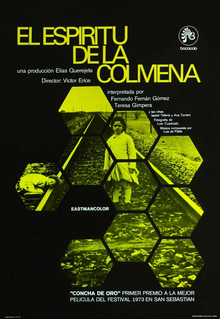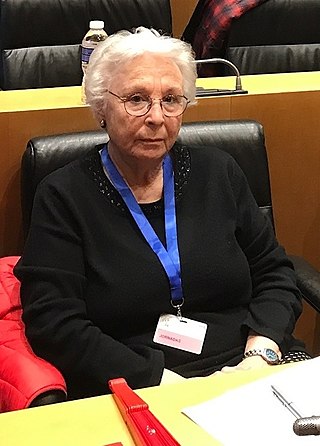
The Spirit of the Beehive is a 1973 Spanish drama film directed and co-written by Víctor Erice. The film was Erice's feature directorial debut and is considered a masterpiece of Spanish cinema. The film, set in a small town in post-Civil War Spain, focuses on a young girl named Ana. It traces family and school dynamics, her fascination with the 1931 American horror film Frankenstein, her exploration of a haunted home and landscape, making subtle references towards the dark, contentious politics of the time.

Don Manuel García EscobarMML, better known as Manolo Escobar, was a Spanish singer of Andalusian copla and other Spanish music. He was also an actor and performed in multiple musicals. His popular songs include "El Porompompero" (1962), "Mi carro" (1969), "La minifalda", and "Y viva España".

Angélica María Hartman Ortiz, known professionally as La novia de Mexico, is a Mexican actress and singer. Her songs El hombre de mi vida peaked at No. 6, Reina Y Cenicienta peaked at No. 9, Prohibido (Prohibited) peaked at No. 13, and El Taconazo peaked at No. 34 on the hot Latin songs chart.

Irán Eory was an Iranian-born actress. She achieved fame in Mexico after moving to that country in the late 1960s.

María del Pilar Cuesta Acosta, known professionally as Ana Belén, is a Spanish actress and singer. She and her husband are considered symbols of the Spanish Transition, and her songs and albums often feature boldly-titled works with social and political content.

María del Socorro Tellado López, known as Corín Tellado, was a prolific Spanish writer of romantic novels and photonovels that were best-sellers in several Spanish-language countries. She published more than 4,000 titles and sold more than 400 million books which have been translated into several languages. She was listed in the 1994 Guinness World Records as having sold the most books written in Spanish, and earlier in 1962 UNESCO declared her the most read Spanish writer after Miguel de Cervantes.

María del Pilar Bardem Muñoz was a Spanish film and television actress. In 1996, she won the Goya Award for Best Supporting Actress for her role in Nobody Will Speak of Us When We're Dead. She was the mother of Carlos, Mónica, and Javier Bardem.

Alberto Closas Lluró was a prolific Spanish film actor who appeared in the Cinema of Argentina in the 1940s and 1950s and in Spanish cinema after 1955.

Concepción Velasco Varona, known professionally as Concha Velasco, also Conchita Velasco, was a Spanish actress, singer, dancer, television presenter, and theatrical producer. She received numerous accolades throughout her career in film, theater, and television spanning over six decades, including two National Theater Awards presented by the Spanish Ministry of Culture in 1972 and 2016, the Lifetime Achievement Award presented by the Spanish Television Academy in 2009, and the Honorary Goya Award presented by the Spanish Film Academy in 2012.
Aurora Clavel is a Mexican film and television actress who is noted for her roles in the movies Tarahumara (1965) and Once Upon a Scoundrel (1973), as well as in numerous telenovelas. For example, she played Mama Lupe in Mariana de la Noche. She belongs to the last decade of the Golden Age of Mexican cinema and to the last decade of the Classical Hollywood cinema.

Fernando "Papi" Cortés was a Puerto Rican film actor, writer and director. He was born in San Juan, Puerto Rico, but he spent most of his adult life in Mexico City, where he died. On 1932, while in New York City, Fernando Cortés married Puerto Rican childhood friend María del Pilar Cordero, who adopted the stage name of Mapy Cortés. The couple soon traveled to Spain with a Cuban theatrical troupe. They worked on the Spanish stage, radio and film until the outbreak of the Civil War in 1936. Fernando progressively began to take a backseat as actor and baritone and focused on promoting the career of his wife Mapy, who became a noted vedette in Barcelona.

Josefina Molina ReigMMT is a Spanish feature film director, screenwriter, TV producer and scene director. She was one of the first female directors in Spain and is also known for directing such notable feature films as Función de noche (1981) and Esquilache (1988), as well as the television series Teresa de Jesús (1984). Esquilache was entered into the 39th Berlin International Film Festival. Teresa de Jesús won several awards, including the Antena de Oro (1984), and the TP de Oro.

Patricia Moran Shepard was an American film actress based in Madrid, Spain. She appeared in more than fifty Spanish, Italian and French films from the 1960s to the 1980s, notably several cult horror films.

Silvia Solar was a French actress and prolific minor star in Spanish cinema. The majority of her appearances were in the 1960s and 1970s.
Álvaro de Luna Blanco was a Spanish actor. He performed in more than one hundred films since 1961. He was most known for El Algarrobo in Curro Jiménez.
Bárbara Rey is a Spanish film and television actress. She is the daughter of Andrés García Valenzuela and Salvadora García Molina.

Montserrat Julió was a Spanish film and television actress. She died on 26 January 2017 at aged 88.
Amparo Valle Vicente was a Spanish actress. She appeared in more than eighty films from 1964 to 2016.
Petra de Nieva was a prolific Spanish film editor who worked in the industry from the 1940s through the 1970s.
María Teresa Rivas was a Mexican actress. Along with Silvia Derbez, she is considered one of the pioneers of telenovelas in Mexico, appearing in more than 50 in her career, beginning with an iconic villain role in Gutierritos (1958).














